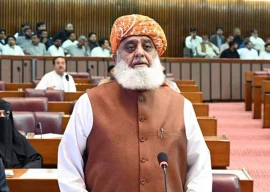
Barring significant and upfront increases in electricity tariffs, the incoming Nawaz administration will face an energy sector debt that is rapidly approaching Rs1 trillion.
According to water and power ministry officials, the existing stock of liabilities in the energy sector is around Rs500 billion, but this number does not include several other liabilities that are about to arise. Among these is approximately Rs200 billion in fuel cost adjustments that the National Electric Power Regulatory Authority was not able to approve during the fiscal year that ends June 30, 2013.
The power tariff in Pakistan consists of two components. The first is the base tariff which is supposed to account for the operational and maintenance costs, financial costs and allowed returns on equity for investors in the power sector. The second component is the fuel cost adjustment, which varies from month to month, depending upon average fuel prices and fuel mix of a power producer.
In June 2012, power distribution companies filed petitions with Nepra to allow them to raise tariffs for the higher costs faced during the outgoing fiscal 2012. Under pressure from the previous administration, Nepra refused to take a decision on the matter, leaving those liabilities to pile up during almost the entirety of fiscal 2013. Meanwhile, an additional complication arose when the law ministry term retroactive increases in power tariffs illegal.
But the power companies cannot make their costs go away and will claim that Rs200 billion as part of their next request for tariff adjustments at the start of fiscal 2014.
In addition, Nepra had planned to raise electricity tariffs by an aggregate amount of another Rs200 billion in order to reduce the cost of power subsidies in fiscal 2013. That did not happen and unless the incoming Nawaz administration makes the decision to implement that rise, it will face a massive subsidy bill.
“The new government has no choice: either it will have to charge consumers for two years worth of piled-up liabilities or else it will face a Rs600 billion subsidy bill in its first year in office,” said one person familiar with the matter.

That amount does not include the existing stock of Rs500 billion of circular debt, taking the government’s total liabilities during its first year in office to Rs1.1 trillion.
As the Pakistan Muslim League Nawaz prepares to take office, the party leadership is considering energy its top policy priority and is finalising the various components of its plan to tackle the problem. Among the policies under consideration are cutting power supply to Karachi in order to increase supply to Punjab, privatising gas production and distribution companies, and borrowing money from Saudi Arabia to pay all or most of the Rs500 billion in existing circular debt.
The decision to cut power to Karachi would be a problem. The Karachi Electric Supply Company has a contract to buy 650 megawatts from the state-owned National Transmission and Dispatch Company. But if that supply is cut, the Sindh government is likely to retaliate by reducing natural gas supply to Punjab. Sindh produces over 70% of the nation’s gas and, constitutionally, has the right of first use on that gas. PML-N’s rival Pakistan Peoples Party has a majority in the Sindh Assembly.
Sources say that while the PML-N is willing to consider raising tariffs, it also wants to reduce the cost of generating electricity by shifting more power plants to natural gas. In a bid to better manage the natural gas production and distribution, the PML-N is considering privatising the state-owned distribution companies Sui Northern Gas Pipelines and Sui Southern Gas Company as well as the state-owned hydrocarbon producer Oil and Gas Development Corporation.
In addition, the PML-N is considering removing the managing directors of the state-owned power distribution companies, in a bid to improve their efficiency and reduce power theft, particularly in urban area. Theft of power is the single biggest cause of the current power crisis. The PML-N is also considering cutting off power supply to entities that have not paid their bills and only restoring it after installing pre-paid meters.
The PML-N also wants to appoint an adjudicator to resolve the dispute between the power companies and provincial governments. The power companies claim that the provinces owe Rs110 billion in unpaid bills.
Published in The Express Tribune, May 26th, 2013.
Like Business on Facebook to stay informed and join in the conversation.
COMMENTS (21)
Comments are moderated and generally will be posted if they are on-topic and not abusive.
For more information, please see our Comments FAQ

1734435589-0/Untitled-(51)1734435589-0-165x106.webp)

1734434763-0/Untitled-(50)1734434763-0-165x106.webp)


1734433829-0/Untitled-design-(7)1734433829-0-270x192.webp)
1734436213-0/Untitled-design-(8)1734436213-0-270x192.webp)
1734433746-0/Copy-of-Untitled-(45)1734433746-0-270x192.webp)








solar energy is the answer, cheap solar systems of Rs.500/- that can run one fan and one energy saver, as domestic needs of the electricty is far less than industrial needs. this way electrcity theft can be controlled by masses.
PML-N shall face the most severe and most worst ever conditions in regard of electricity's crises created by PPP and in these approximately 1 trillion Rupees' circular debt in power sector the 50% defaulters are government's departments and large industries as has been shown in NAB's reports.The most important question rises here.id est,how the defaulters shall refund their electricity's dues to overcome electricity's crises?????
@a citizen: The biggest defaulters are PIA, Railways, defense services and other law enforcement agencies. Who would authorize cutting electricity to these. The circular debt hides under it widespread bankruptcy. Many hospitals too have electricity arrears. If electricity was cut, the same people would start to complain.
Mess, mess and everywhere a mess.
If liabilities increase up to PRs. 1.1 trillion, how and when will the debt be extinguished? The two components described in the second para to attract IPPs are seminal incentives to get the power sector going. Obviously, the government did not take the effect of these incentives seriously and now the outstanding debt has become a monolithic burden. Additionally, reducing it by taking a debt from sources and priming up the government ministries is the only option in front of the PMLN to quickly fix the problem. A very serious policy paper on debt reduction will have to become operational because this will be the overhang in all future economic decisions.
The mess in the country's operations is evident everywhere and the hardships of the citizens cannot be over-simplified as a passage of time. Salams
Rs 600b - less than Pakistan Army's official budget for a year (Rs 630b)
Maybe there could be a trade-off? (Do cantonments have load-shedding too?)
Alhamdolillah. This is exactly how Dishonest nations end. No surprises! We gave up our religion and God. God; it seems; has given up on us.
How can circular debit "coexist" with islamic banking in the islamic republic of the pure "what u may call them"?
That means close to 50% of yearly tax collection of the country
and we thought them to be competent for next 5 years. God help Pakistan
Privatizing gas distribution companies is not a bad idea, but Mian Sharif's team must conduct a detailed study in which it should quantify the cost and benefit of each strategy, before pursuing it. Moreover, there is no need to borrow 500bn rupees from Saudis rather invite Saudis to co invest with the government of Pakistan in a fund to unclog the balance sheets of energy companies - offer a rate of 6 to 7% on these investments and some upside participation on the underline performance of the companies - and they will be more than happy to invest...
Pakistan's problems are not unsolvable but these problems have magnified due to dearth of talent in the country. Maybe it is time to start hiring talented Pakistanies from abroad !!
So 1 trillion Pakistani Rs, is about 10 billion dollars. So whats the big deal ? send the bill to China. Its a small amount for them to help there best friend on earth. Friendship has a cost too, demand it.
Since day 1, I am afraid that prosperity in Punjab will come at expense of Sindh. Mr. Nawaz Sharif, before coming into power is already planning about increasing load shedding in Karachi. Please do not do that, a sincere request from a Pakistani.
This is ridiculous. The government might as well ask the State Bank of Pakistan to print Rs. 500 billion and then we can arrange a giant bonfire where we can chuck the money in. The beast wants to be fed, yet no one is willing to state things in black and white.
The cost of producing electricity is greater than the price which consumers pay. People refuse to pay the cost price of electricity, but still pay much much more in UPS's, generators etc. Just put that money into paying the true cost of electricity. All the idle power stations that are shut would come back online.
On the demand side, people, especially the affluent, government and industrial users need to reduce waste and inefficiency. So even if the per unit cost of electricity rises, consumers actually use less electricity to control the increase in the price of power.
Basha dam, Thar coal, Kalabagh dam etc etc, will take a decade or so to develop. We cant wait till then. The PMLN should just make the hard decision from the onset. Raise the price of electricity, get idle power plants back online, with the reduction in load shedding consumers would spend less money on generators etc, and they would see the benefit of paying higher bills and reducing their consumption through better use of electric goods.
Pouring more money into the circular debt is foolishness, while waiting for Saudi bailouts is literally mortgaging out or future to foreign influence.
Lets not make this too complicated, there are two immediate solution: keep everything under govt control and raise electricity prices. move the entire energy sector into the private sector and wash your hands of it and let the market solve the problem.
Essentially its a political problem, not an economic one.
Do whatever they want but they will not get another chance. If they can, they should do something right now!!!
Many nations had to go through tough times to build up...we are not in that bad situation. All we need is a proper system under good governance!
Good Luck to PML N from a PTI supporter!
Three cheers for PPP government !! We deserve this because we elect them.
In Pakistan on average more than 40 percent of the people dont pay any electricity tariffs at all. In FATA more than 80 percent dont pay any bills and in some regions of KPK and Balochistan it accounts to more than 50 percent. Internal Sindh is no exception as well where the theft of electricity crosses 40 percent. The most Optimal Regions where people readily pay bills are some parts of Karachi, Upper Punjab, Azad Kashmir, Gilgit Baltistan and Islamabad where it is around 15 percent. So could anybody tell me that how come the Circular debt crisis will ever go away when most of the people of Pakistan want to act like thieves and never pay any bills??. How long the government can pay the bills of Self Righteous thieves of Pakistan??? Unless government will not clamp down on power thefts and end the Kunda Culture nothing can change and Circular debt will increase and eventually the whole country will default.